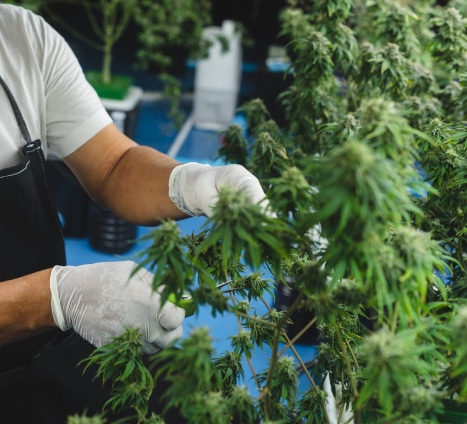How to Get a Cannabis License in Hampshire
Understanding the cannabis licensing process in New Hampshire is crucial for businesses and individuals interested in entering the state’s medical cannabis market since the legalization of medical cannabis in 2013 through legislation outlined in N.H. RSA126-X:1 to 126-X:11. The state of New Hampshire has legalized medical marijuana, allowing businesses to sell medical marijuana to eligible patients.


New Hampshire has not legalized recreational marijuana, but entrepreneurs can still operate a medical marijuana dispensary in New Hampshire by obtaining a marijuana business license. Let’s explore how to get a cannabis license in New Hampshire.
Cannabis License Regulations in New Hampshire
Marijuana legalization in New Hampshire has opened doors for entrepreneurs to start their own marijuana businesses. The New Hampshire Department of Health and Human Services (DHHS) oversees the Therapeutic Cannabis Program, which allows patients with qualifying medical conditions to access cannabis for therapeutic purposes. The program has been expanded to allow out-of-state patients to purchase cannabis from Alternative Treatment Centers (ATCs) in New Hampshire, subject to certain conditions.
Types of Cannabis Licenses in New Hampshire
Cultivation License
- Purpose: Allows for the legal cultivation of cannabis plants for medical use. Licensees are responsible for growing cannabis in compliance with state regulations, ensuring the production of high-quality, safe cannabis for medical purposes.
- Requirements: Applicants must demonstrate an ability to comply with strict security, tracking, and quality control measures. An alternative treatment center license is a must-have license for businesses that want to cultivate, process, and dispense medical marijuana in New Hampshire. This includes but is not limited to, ensuring facilities are secure, implementing a seed-to-sale tracking system, and adhering to agricultural best practices.
- Operational Guidelines: Cultivators must maintain detailed records of their operations, including plant counts, harvest yields, and waste disposal methods. They must also ensure that all cannabis is tested for potency and contaminants before being distributed to dispensaries.
Manufacturing License
- Purpose: This license permits the processing of harvested cannabis into various medical cannabis products, such as edibles, tinctures, and concentrates.
- Requirements: Manufacturers must comply with rigorous production standards, including sanitation practices, product labeling requirements, and dosing accuracy. They must also secure approval for product formulations and packaging from the Department of Health and Human Services.
- Operational Guidelines: Licensees are required to implement quality control measures to ensure the consistency and safety of their products. This includes testing products for cannabinoid content and contaminants, as well as maintaining detailed production and distribution records.
Dispensing License
- Purpose: Dispensary licenses allow for the retail sale of medical cannabis products to registered patients and their designated caregivers. These establishments serve as the primary access points for patients to obtain medical cannabis.
- Requirements: Dispensaries must establish security measures to prevent unauthorized access and diversion. They must also ensure that staff are trained to provide patient education on the use of cannabis for therapeutic purposes.
- Operational Guidelines: Dispensaries are required to verify the eligibility of patients and caregivers by checking their registry identification cards. They must also track all sales transactions and report dispensing data to the state. Dispensaries play a critical role in patient education, offering guidance on product selection, dosing, and safe use practices.
Alternative Treatment Centers (ATCs)
- Overview: ATCs are nonprofit entities authorized by the state to handle the cultivation, manufacturing, and dispensing of cannabis exclusively for medical purposes. These centers are subject to stringent oversight and must operate in accordance with comprehensive state regulations to ensure patient safety and product integrity.
- Operational Scope: ATCs serve as the cornerstone of New Hampshire’s medical cannabis program, offering a vertically integrated model that encompasses the entire cannabis supply chain from seed to sale.
Compliance and Monitoring
All licensees in New Hampshire are subject to ongoing compliance checks and monitoring by state regulatory bodies. This includes inspections, audits, and mandatory reporting requirements to ensure adherence to state laws and regulations. Non-compliance can result in penalties, including fines, suspension or revocation of licenses, and legal action.Alternative Treatment Centers
How to Obtain a Cannabis License in New Hampshire
Prospective business owners must first identify the type of license they require and then complete the necessary steps, including obtaining permits, ensuring zoning compliance, and conducting background checks for employees. The application process involves submitting required documents and fees, with license fees ranging from $20,000 to $30,000 depending on the license type.
Remaining Compliant with New Hampshire Regulations
Compliance with state cannabis regulations is crucial. This includes adhering to guidelines on selling to minors, product safety, and ensuring facilities meet state-mandated security requirements. Non-compliance can result in significant penalties, including fines, revocation of licenses, and criminal charges.
Risk and Compliance Factors
Operating a cannabis business in New Hampshire involves navigating complex regulations and staying informed of legislative changes. Prospective licensees must prioritize regulatory compliance to avoid legal repercussions and ensure the success of their business.
Final Thoughts
The cannabis industry in New Hampshire offers opportunities for businesses and provides patients with access to therapeutic cannabis. However, success in this industry requires careful planning, adherence to regulations, and a thorough understanding of the licensing process.
Legal References and Citations
- New Hampshire RSA126-X:1 to 126-X:11 for medical cannabis legislation.
- Department of Health and Human Services (DHHS) for regulatory oversight and program information.
Additional Resources
For more detailed information and updates on the cannabis licensing process in New Hampshire, visit the New Hampshire Department of Health and Human Services website and the New Hampshire Cannabis Information Portal.
FAQ Section
What are the types of cannabis licenses available in New Hampshire?
Cultivation, manufacturing, and dispensing licenses are available for businesses.
How can out-of-state patients purchase cannabis in New Hampshire?
Out-of-state patients can purchase cannabis from ATCs in New Hampshire up to three times per year, provided they have a valid medical cannabis ID from their state or Canada.
What are the requirements for obtaining a cannabis license in New Hampshire?
Requirements include proof of New Hampshire residency or business registration, background checks, and financial viability.
This overview provides a foundational understanding of the cannabis licensing regulations in New Hampshire, offering a starting point for individuals and businesses interested in the medical cannabis industry.